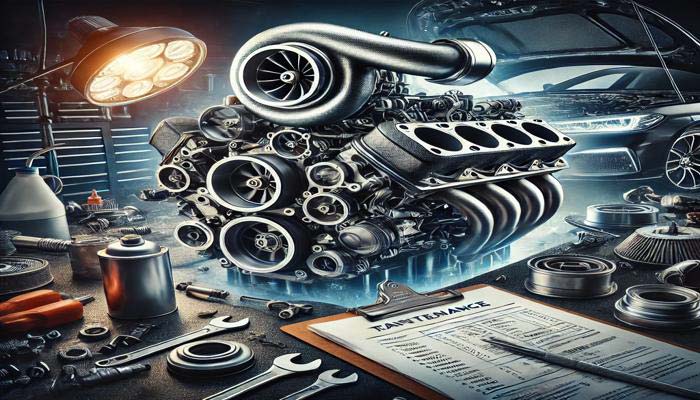
Boosted engines, whether turbocharged or supercharged, are powerful machines designed to enhance the performance of vehicles by increasing air intake and boosting power output. However, the added strain these engines experience means that regular maintenance is critical to ensure long-term reliability and efficiency. In this article, we’ll discuss why regular maintenance for boosted engines is essential and how it can help prevent costly repairs and ensure optimal performance.
Understanding Boosted Engines
Boosted engines work by forcing extra air into the engine’s combustion chamber, allowing for better fuel combustion. This results in higher power output and better overall vehicle performance. Turbochargers and superchargers are the two most common types of engine boosters, and both require special attention when it comes to maintenance. Without regular upkeep, these engines are more prone to wear and tear due to the increased pressure they endure.
Why Regular Maintenance Matters
- Improves Longevity
The components of a boosted engine, such as the turbocharger or supercharger, operate under extreme pressure. Over time, this can lead to faster wear compared to naturally aspirated engines. Regular maintenance ensures that parts like bearings, seals, and gaskets are checked and replaced if necessary, extending the engine’s life. - Optimizes Performance
Dust, dirt, and other debris can clog filters and air intake systems, causing reduced efficiency. Regular engine check-ups help to keep all parts clean and functioning smoothly, ensuring that your engine performs at its best. - Prevents Overheating
Boosted engines generate a lot more heat due to the increased pressure. Overheating can lead to severe engine damage. Regular maintenance, including cooling system inspections and coolant replacements, ensures that the engine runs at an optimal temperature, preventing heat-related issues. - Reduces Fuel Consumption
When boosted engines are not properly maintained, they can become inefficient, consuming more fuel than necessary. A well-maintained engine runs smoother and uses fuel more efficiently, helping to reduce overall fuel costs. - Prevents Expensive Repairs
Catching small issues early through regular maintenance can prevent them from turning into costly repairs. For instance, failing to replace worn-out parts can lead to major engine failures, which are much more expensive to fix.
Key Maintenance Tips for Boosted Engines
- Regular Oil Changes
Boosted engines rely heavily on proper lubrication due to the high temperatures and pressure they generate. Using high-quality oil and changing it frequently helps to protect engine components and prevent premature wear. - Monitor Boost Levels
Checking and maintaining the proper boost pressure is essential. If the pressure is too high, it can cause engine damage. Regular inspections will ensure that the turbocharger or supercharger is functioning within safe limits. - Inspect Air Filters
Dirty or clogged air filters can reduce airflow to the engine, affecting performance. Regularly replacing air filters is an easy but critical step in maintaining your boosted engine’s efficiency. - Check for Leaks
Boosted engines often develop leaks around seals and gaskets due to the increased pressure. Regularly inspecting for leaks and addressing them early can prevent more significant damage to the engine. - Coolant System Maintenance
As boosted engines generate more heat than normal engines, it’s crucial to ensure that the cooling system is working properly. Regularly checking the coolant levels and replacing old coolant helps prevent overheating and keeps the engine running smoothly.
FAQs on Boosted Engine Maintenance
- What happens if I don’t maintain my boosted engine regularly?
Failure to maintain a boosted engine can result in performance degradation, increased fuel consumption, overheating, and potential engine failure. Regular upkeep helps to avoid costly repairs and ensures that the engine remains in good condition. - How often should I change the oil in my boosted engine?
It’s recommended to change the oil in a boosted engine every 3,000 to 5,000 miles, depending on driving conditions and engine use. Always follow the manufacturer’s recommendations for oil changes. - Can I use regular oil in a turbocharged engine?
No, it’s crucial to use high-quality, turbo-specific synthetic oils that can withstand the higher temperatures and pressure in a turbocharged engine. Regular oil may not provide adequate protection. - How do I know if my turbocharger or supercharger is malfunctioning?
Common signs of issues include reduced power, strange noises (such as whining or rattling), excessive exhaust smoke, or the engine check light turning on. If you notice any of these signs, have your engine checked immediately. - Does driving style affect the maintenance needs of a boosted engine?
Yes, aggressive driving can put additional strain on the engine, meaning it may require more frequent maintenance. If you drive your vehicle hard, regular check-ups are even more critical to ensure the engine stays in good working order.
By following these tips and understanding the importance of regular maintenance, you can ensure that your boosted engine continues to perform at its peak while avoiding costly repairs and unnecessary downtime.
If Like This Article Visit Our Website. Collect From Wekiapedia